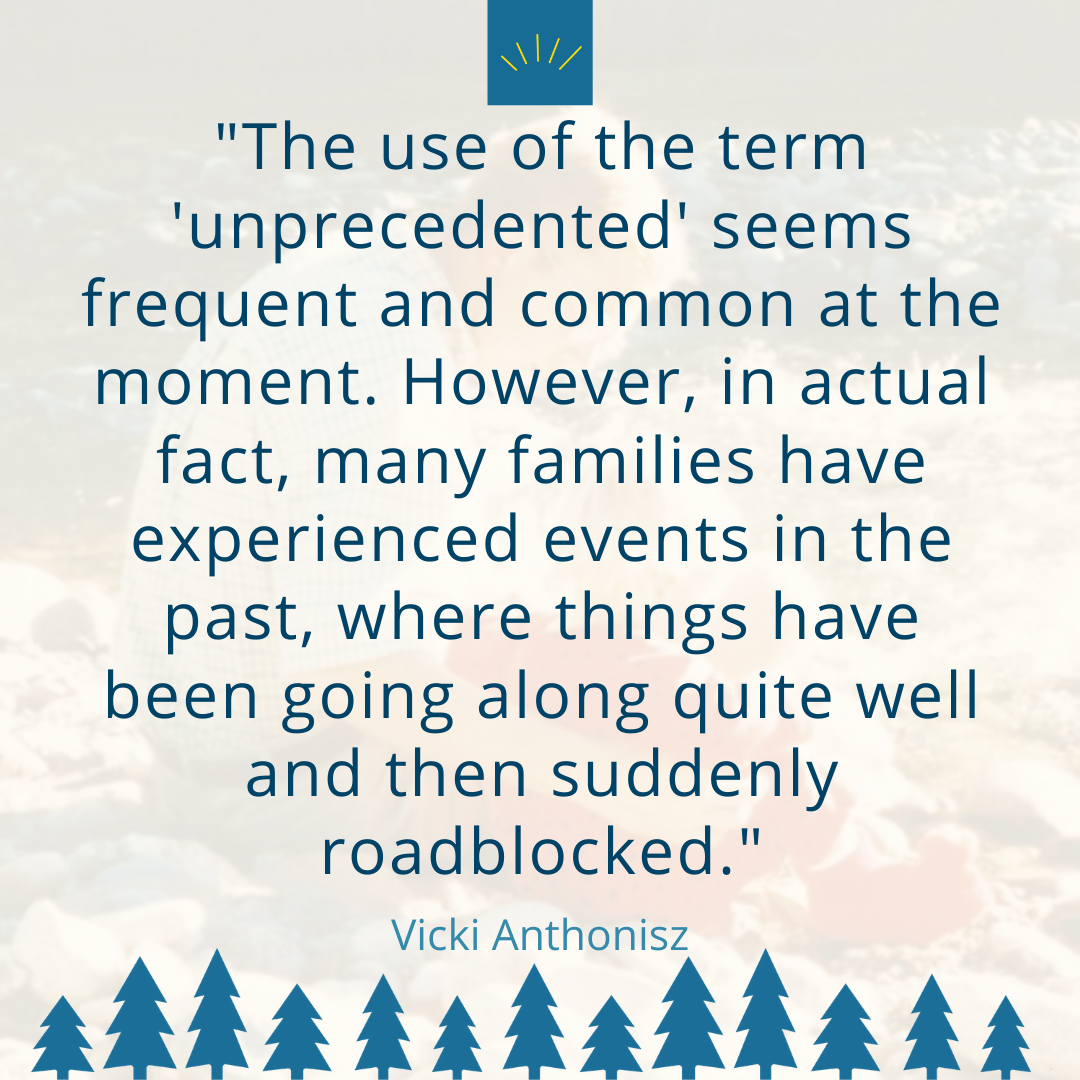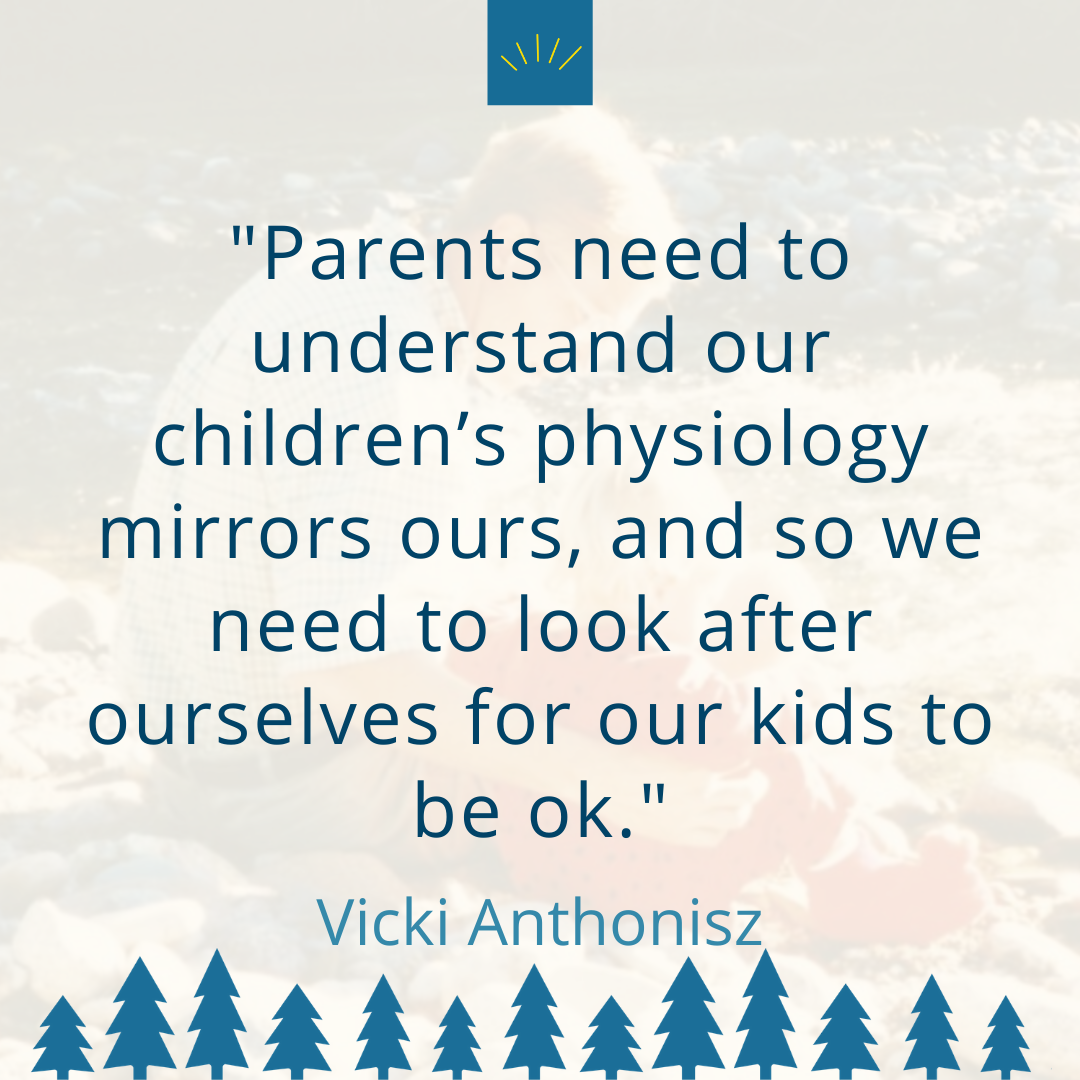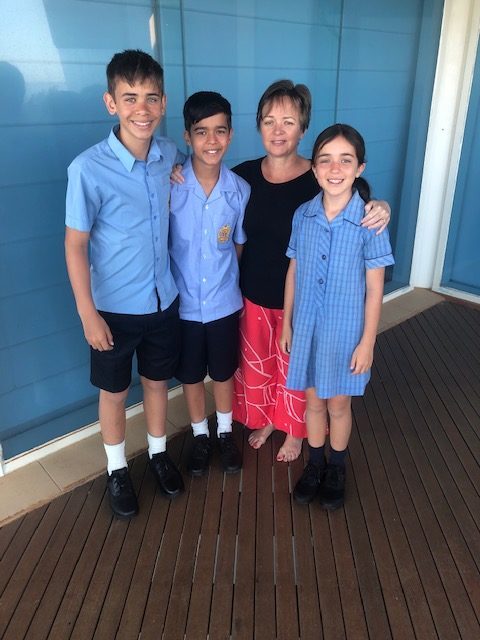Hi SP Friends,
I absolutely love receiving emails from Sunshine Parenting Podcast listeners with feedback, ideas, and questions. This email came in from Vicki, who is a chiropractor who specializes in treating patients for the physical effects of stress. Vicki lives in Melbourne, Australia, with her husband and three children. If you’ve heard my phrase, “Iso for the Rona” for the past few weeks, she’s the listener who shared the phrase with me! More of Vicki’s insights are shared in her email (below), which she gave me permission to share.
If you have a comment, idea, or question you’d like me to cover here on my website or on a future episode of the podcast, email me or record a voice message!
Here’s to raising kids who become thriving adults despite the challenges they are – and will continue to – face!
Stay safe, healthy, & at home,
Audrey

Vicki’s family. Her comment, “Not much more Australian than a photo on the beach with Santa! That’s me, my fourteen year old Sam, twelve year old Toby, ten year old Ruby and husband Kingsley.”
Hi Audrey,
Thank you for your podcast. I have been enjoying it for months now, but found the last one particularly great. I am in Melbourne, Australia and work as a chiropractor who specialises in Neuroemotional Technique, (NET) which is a treatment for the physical effects of stress. In particular, I work with a lot of children and families.
I have found at work, that a lot of families are suffering from grief at what would have been this year, but not actually recognising it as such. The loss of their sporting season, their school year, their social milestones, their work project etc. Encouraging them to recognise this as a loss and grieve it seems to be beneficial for some in moving forward.
Also many families seem to be stuck in disgust. Disgust actually activates a different part of the brain called the insula, which acts to keep us safe. It is activated when we eat, smell or drink something off and also when social norms are violated, which most of us are experiencing, in that we can’t hug each other, celebrate together, visit friends and family etc. Fortunately using NET, we can affect this brain pathway to move out of disgust and let other coping mechanisms start to kick in.

The use of the term “unprecedented “ seems frequent and common at the moment. However, in actual fact, many families have experienced events in the past, where things have been going along quite well and then suddenly roadblocked. A cancer diagnosis, a serious injury, marital breakdown, bankruptcy, losing a loved one or failing a course as examples. Helping families reflect on these past experiences is useful for some, in that they can see they have a resilience mechanism for coping and in some instances, that roadblock led them to a better place.
I also have three children, aged 14,12 and 10. My colleague, Emma Murray writes about having an “iso word” and mine has been “siesta”. I have found sleep to be restless at night at times, or that I am waking up early. I have found that a little nap during the day has lessened my fatigue, reduced my worry and made me calmer with my kids.
(Not sure if you are familiar with iso? In Australia, it is a bit of a national trend to shorten words, so we would say we are in “iso for the rona”, meaning in isolation for corona virus.)
One of my sons is quite competitive and really missing his sport. I have found it helps a lot to build an element of competition into our daily exercise each day, even if it is only him competing against himself, for example doing more star jumps, skimming the rocks further etc.
We have been having family meals together, which in normal life we often struggle to do. Playing board games online such as Drawful2 has been useful. They run a little class or story on Facetime with their younger cousins in another city, which they enjoy and it helps their parents out, as they are doing it much harder than us with younger kids and working from home.
Fortunately, we have space in our house so everyone can have a little zone of their own when they need it and we will sometimes suggest that someone go “soak up their zone” when they are getting a bit over being stuck at home. This has applied to both parents and kids at times.
At times we have had boilovers (Audrey’s note: This is another amazing term), so we are reminding each other of our usual policy to only need to say sorry once and it being up to the other person to accept the apology and offer forgiveness.
Lastly, I would encourage the mums to make sure they leave space for the dads to speak (with apologies for the gender stereotyping). I am noticing at work that women will talk a lot more than men and many male patients are just glancing over some pretty major events in their lives. Whilst both men and women have lost major parts of their expression of identity, particularly for men, they have lost many of the ways they would normally “talk” or communicate with each other, through lost avenues in work, sport, exercise, having a beer together etc.I think it’s important for the health of our families to remember to check where Dad is at as well.
In my practice I work with a lot of patients with chronic pain which is often triggered by stress. Many of these patients are actually experiencing an improvement in their symptoms during iso. I have seen some of these patients for years and I hypothesize that in normal times, a lot of their energy in recovery is dispersed in trying to keep up with everyone else and feeling conflicted when they can’t. Physiologically this results in increased inflammation and symptoms. When these patients have the world adjust to their slower pace they seem to going much better. We are saying they are ‘built for iso.’
One of the key strategies in helping a patient recover from chronic pain is often to encourage them to seek and accept support. It is no coincidence that “stoic” and “stuck” are fairly similar words. Many chronic pain patients feel misunderstood and like they have to things on their own which increases their inflammation further. So I have had to reflect as a practitioner how to incorporate this aspect of healing in a time of isolation. I feel the best approach is one of self support in the current setting. Being kinder to oneself, with expectations, standards and outcomes. Prioritizing what you want to do for yourself where possible ( I left a kitchen full of dishes to write this! ), indulge a little longer in a bath or meditation, let go of guilt about not feeling the energy or ability to support others in the way you normally would (compassion fatigue), speaking and relating kindly to your body when it needs some support.
I also work with a lot of children using NeuroEmotional Technique (NET -to learn more, visit Stressed the Documentary on You tube).
Whenever I work with kids, I also work with the parents and their physiology. Wendy Berry Mendes and her team in California have clearly demonstrated that a change in the parents physiology in relation to stress, results in a similar response in the child’s physiology, even when the child is not present when the stress occurs. I think in this time of iso, it is so important for parents to understand this. It’s called “Physiological Covariation”. When we use NET to bring the parent out of fight/flight, we find we get a much deeper response to treatment than just working with the child alone. If you think of the lioness and the cub on the riverbank, the cub should just hang out and play, but if the lioness tenses, the cub should tense and if she runs the cub should run. These responses should be automatic and rapid.

Parents need to understand our children’s physiology mirrors ours and so we need to look after ourselves for our kids to be ok. We need to put our own oxygen mask on first to be able to help our kids with theirs! (No surprise to me I came home to a vomiting child yesterday!).
Once again, love your work, definitely a bright spot in the week at present,
Kind regards,
Vicki Anthonisz

Vicki with her kids.
